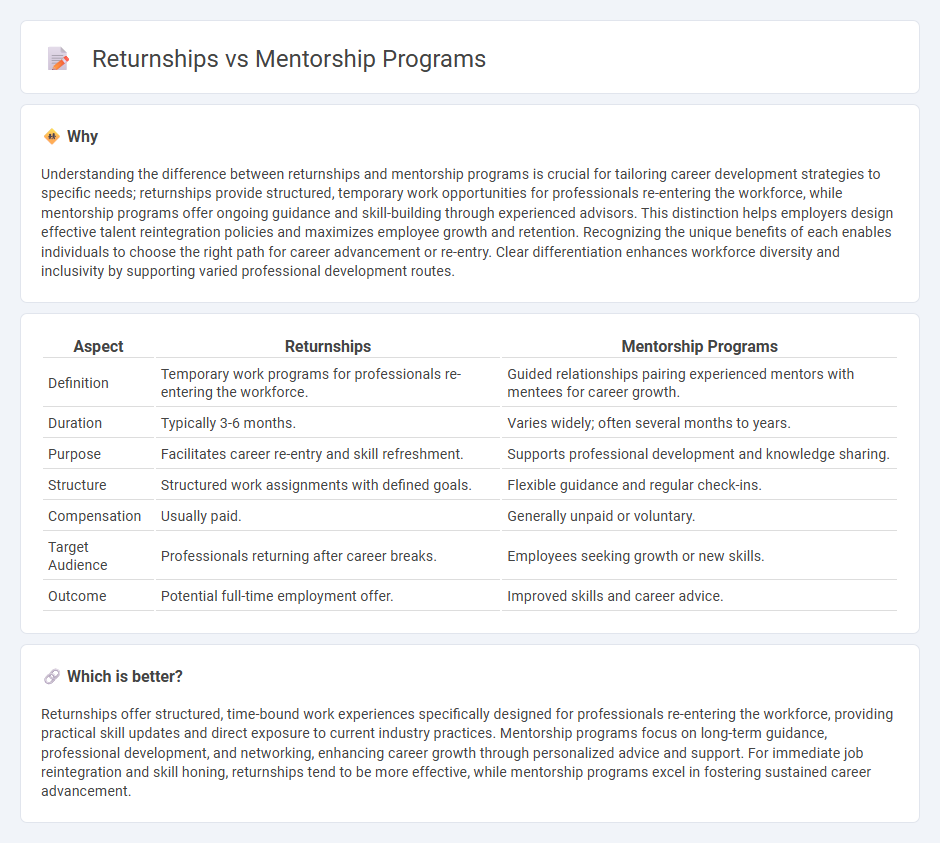
Returnships offer structured, paid opportunities for professionals reentering the workforce after career breaks, focusing on skill refreshment and practical experience. Mentorship programs connect experienced employees with mentees to provide guidance, career development, and knowledge transfer without formal employment reentry components. Explore how each approach benefits career growth and workforce reintegration.
Why it is important
Understanding the difference between returnships and mentorship programs is crucial for tailoring career development strategies to specific needs; returnships provide structured, temporary work opportunities for professionals re-entering the workforce, while mentorship programs offer ongoing guidance and skill-building through experienced advisors. This distinction helps employers design effective talent reintegration policies and maximizes employee growth and retention. Recognizing the unique benefits of each enables individuals to choose the right path for career advancement or re-entry. Clear differentiation enhances workforce diversity and inclusivity by supporting varied professional development routes.
Comparison Table
| Aspect | Returnships | Mentorship Programs |
|---|---|---|
| Definition | Temporary work programs for professionals re-entering the workforce. | Guided relationships pairing experienced mentors with mentees for career growth. |
| Duration | Typically 3-6 months. | Varies widely; often several months to years. |
| Purpose | Facilitates career re-entry and skill refreshment. | Supports professional development and knowledge sharing. |
| Structure | Structured work assignments with defined goals. | Flexible guidance and regular check-ins. |
| Compensation | Usually paid. | Generally unpaid or voluntary. |
| Target Audience | Professionals returning after career breaks. | Employees seeking growth or new skills. |
| Outcome | Potential full-time employment offer. | Improved skills and career advice. |
Which is better?
Returnships offer structured, time-bound work experiences specifically designed for professionals re-entering the workforce, providing practical skill updates and direct exposure to current industry practices. Mentorship programs focus on long-term guidance, professional development, and networking, enhancing career growth through personalized advice and support. For immediate job reintegration and skill honing, returnships tend to be more effective, while mentorship programs excel in fostering sustained career advancement.
Connection
Returnships and mentorship programs both support workforce reintegration by providing structured guidance and skill development for individuals reentering employment after a career break. Returnships offer temporary, project-based roles that often include mentorship components, enhancing professional growth and confidence. Mentorship programs facilitate knowledge transfer and networking opportunities, which are essential for successful transitions and sustained employment outcomes.
Key Terms
Mentorship Programs:
Mentorship programs provide structured guidance by pairing experienced professionals with mentees to foster skill development, career growth, and networking opportunities. These programs emphasize personalized coaching, long-term relationship building, and industry-specific knowledge transfer. Discover how mentorship programs can accelerate your professional journey and unlock new career possibilities.
Guidance
Mentorship programs provide ongoing guidance by pairing experienced professionals with mentees to foster skill development and career growth. Returnships focus on reintegrating professionals into the workforce after career breaks, offering structured support and practical work experience. Explore how these programs uniquely support career development and professional reintegration.
Career Development
Mentorship programs provide personalized guidance and skill development through ongoing relationships with experienced professionals, enhancing career growth and networking opportunities. Returnships offer structured, temporary work placements designed to help individuals re-enter the workforce by gaining relevant experience and rebuilding confidence after a career break. Explore how these career development pathways can empower your professional journey.
Source and External Links
Mentorship Programs in the Workplace: Your 2025 Ultimate Guide - Explores structured mentor-mentee relationships, detailing traditional, reverse, and group mentorship for knowledge transfer and professional growth.
The Ultimate Guide to Structuring An Effective Mentorship Program - Outlines a six-step framework for designing mentorship programs, emphasizing objective-setting, matching, supporting materials, and ongoing evaluation for organizational impact.
What Are Mentorship Programs? 9 Important Questions for Leaders - Describes the operational process of mentorship programs, from administrator setup and participant matching to progress tracking, evaluation, and continuous improvement.
 dowidth.com
dowidth.com